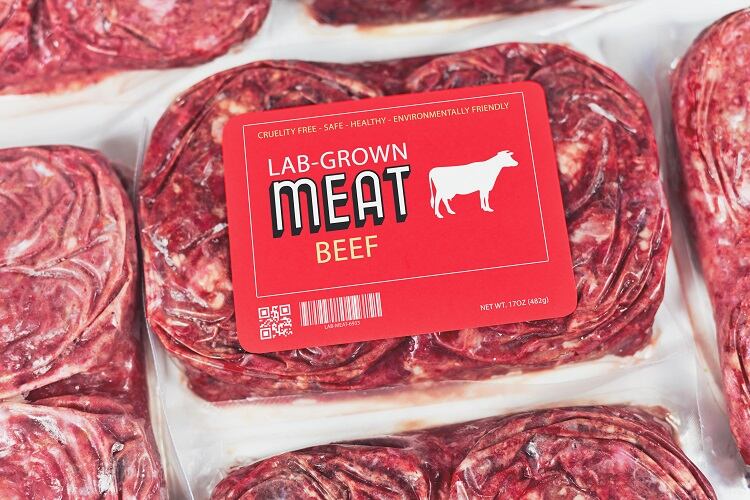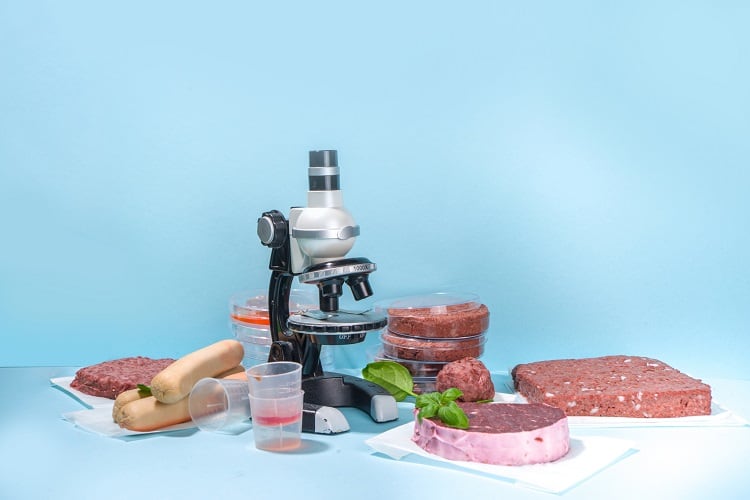In Europe, there is an obvious disconnect between the pace of cell-based innovation, and the number of cultivated meat products listed on restaurant menus.
On the one hand, several cell-based meat companies in Europe – where over a quarter of all cultivated meat companies are located – are moving fast from R&D towards commercialisation. Cultivated foie gras maker Gourmey, for example, is transitioning from ‘R&D to production and commercialisation’ with a new facility in Paris, and Mosa Meat recently announced plans to double production space in Maastricht, the Netherlands.
On the other hand, not a single lab-grown meat product is on the market in Europe. In fact, no EU- or UK-based start-up has even submitted a novel food dossier on cultivated meat to regulators.*
Why is this the case? What can be done to accelerate the regulatory approval process in these jurisdictions?
‘It’s political, at a Member State level’
That is not to say that cultivated meat is yet to reach the market. In late 2020, Singapore became the first and only country to approve cell-based meat for commercialisation.
The reason why cell-based meat is on restaurant menus in Singapore, but not in Europe, is at least two-fold. For starters, the approval processes differ significantly. In Singapore, which aspires to become 30% self-sufficient by 2030, the decision to approve the commercialisation of novel foods is decided by and for one country only.
The European Union, on the other hand, is made up of 27 Member States, who all have a say. The Novel Foods authorisation process is divided into two parts: risk assessment and risk management. If a company receives a positive safety review from the European Food Safety Authority (EFSA), its dossier will proceed for review by the Standing Committee on Plants, Animals, Food and Feed (PAFF), made up of representatives from all Member States.
When the PAFF Committee casts its vote, a 55% majority ensures its approval. But, that 55% majority must represent 65% of the population of the EU.
It’s not a straightforward, one-country decision, according to Robert Jones, Head of Public Affairs at Mosa Meat and President of Brussels-based industry association Cellular Agriculture Europe.
“You have to think about the politics of what you’re trying to get approved, even at the Member State level. It’s not just an EU sole decision,” he told delegates at Future Food-Tech in London.
The risk of ‘losing control of the clock’
That the approval process is likely more stringent in Europe than in other jurisdictions is not the only reason cell-based meat innovators have yet to submit their novel food dossiers.
As Head of Public Affairs at Mosa Meat – the Dutch start-up responsible for developing the world’s first cultivated beef – Jones suspects part of the reason lies in a lack of understanding.
“All of the companies in our space want to have a better understanding of what exactly is going to be asked of them in terms of analysis, and what regulators are looking for, because this is a very new technology.
“Right now, most companies in our space are scoping the process and taking advantage of opportunities to educate stakeholders and regulators about what we’re doing and what our process looks like.”
The obvious benefit of knowing exactly what the regulator wants from the start-up prior to submitting, is that the start-up maintains control of the clock. If EFSA wants more information on a dossier, it hits pauses and ‘stops the clock’, which Jones suggested can lengthen the process significantly.
“If you submit a dossier to EFSA and they have a lot of questions about it, they are going to stop the clock. And that is going to add 30, 60, 90 days automatically. Real quickly, it can go from 9 months to 18 months or longer [meaning that] approval could take a lot longer than you would like.”
Although not in the cell-based meat sector, this is what happened to US-based Impossible Foods when it submitted its genetically modified organism (GMO) animal-free heme dossier to the European Commission. It took around 18 months for the dossier to be validated, and then it was put on pause – or ‘clock stopped’.
EFSA returned to Impossible Foods to request more information. As of April this year, the dossier was still on pause.

Greater engagement between start-ups, stakeholders, and regulators could help cell-based meat innovators better understand what is required of them, and ultimately, encourage them to submit their novel food dossiers for approval, suggested Jones.
Yet finding these opportunities is not easy, we were told. “One of the challenges is that there are not a lot of opportunities to engage EFSA staff before you’ve submitted.”
In Jones’ role as President of Cellular Agriculture Europe, he is working to change this by meeting members of the European Commission, DG SANTE, and the PAFF Committee, and ‘taking advantage of as many opportunities as possible’ to talk to regulators.
FSA responds: ‘We’re regulators, not consultants’
This begs the question: was there greater engagement between the Singapore Food Agency (SFA) and the manufacturer of its first approved cell-based meat product, Eat Just?
According to Ira van Eelen, co-founder of Dutch cultured meat farm RESPECTfarms, the SFA demonstrated proactiveness throughout the regulatory approval process. “I liked that in Singapore, they did get away from the desk and looked at the companies, looked for what they wanted to know,” she told delegates at Future Food-Tech.
“That speeds up the process, and that is something we wish to happen in the EU – that they would actively…get out of the start-ups what they need to [know].
“It’s not that I want anyone to cut corners, but I do want [EFSA] to be slightly more proactive.”
In the UK, the Food Standards Authority (FSA) is responsible for Novel Foods authorisation on home soil as of January 2021. According to Paul Tossell, Head of Novel Foods and Radiological Policy Team, FSA, the regulatory process – adopted from EFSA – ‘hasn’t changed significantly’ in that time.
The FSA is open to engaging with cell-based meat start-ups, he told delegates. But at the same time, the FSA’s role in the process must be clear: “We can help [start-ups] understand their applications. We haven’t changed it from the European model, it’s still the same system.”
Tossell continued: “[But] we have to [draw] a line, where we are regulators rather than consultants. We cannot write your application for you.”
The FSA regulator encouraged start-ups to file their dossier as soon as possible. “The system is open, but we need applications to actually process them through…We are open for business…”
Should regulators be prioritising certain novel food applications?
The FSA is indeed, ‘open for business’. Since the regulator took over Novel Foods approval for the UK, the first tranche of approvals has already come through. “The process is there, and it is working,” stressed the FSA’s Tossell.
Over the last two years, the FSA has looked at around 120 novel food applications for cannabidiol (CBD), for example, with enquiries alone in this area totalling more than 800.

For Mosa Meat’s Jones, that the FSA is processing novel food applications for CBD – but not novel foods he believes align with national priorities – is problematic.
“It’s not just regulatory, it’s a political problem,” he stressed. “I think there needs to be more coherence between our policy priorities in Europe and the UK, and the ability for regulators to make decisions. If we are going to meet the goals of the Paris Climate Accords [which aims to limit the temperature increase to 1.5°C above pre-industrial levels] then we need to give regulators the tools they need to set priorities.”
CBD, he continued, is not going to help industry meet the Paris Agreement targets. “Whereas, a lot of the novel foods and products we’re trying to bring to market could play a real role in climate impact.
“I think regulators should be able to say: ‘No, it’s not necessarily first-come-first served. We’re going to give priorities to products that help us meet our national goals’.”
What does the future hold? ‘Nobody wants to get left behind’
What else could help accelerate regulatory approval for cell-based meat products in Europe and the UK?
Since the UK withdrew from the European Union, an opportunity exists to diverge from EFSA’s stringent regulatory approval process, suggested Mosa Meat’s Jones. “The UK should get a lot of credit because there is a very robust conversation going on right now about how to take advantage of the window of opportunity post-Brexit [on the risk management side] to optimise the Novel Foods law… About how to make the process go faster and more efficiently [without compromising safety].”
This could make the UK a more attractive market option for cell-based meat players, suggested Jones. “There are a lot of companies around the world that are now, all of a sudden, looking at the UK.”
Other attractive markets for cell-based meat innovators are undoubtedly Singapore – where cultivated meat is already commercialised – and Israel, which boasts a thriving food tech scene.
But recent announcements from the two largest global economies, the US and China, could also help move the needle on regulation in Europe and the UK.
Last month, US President Joe Biden announced an executive order on Biotechnology and Biomanufacturing Innovation, which includes lab-grown meat. And in January of this year, China pinpointed cultivated meat and related technologies as areas for R&D investment under its five-year plan.
“There is a real sense of global competition starting all of a sudden,” said Jones. “And nobody wants to get left behind. That’s exactly what we need in order to accelerate this.”
*As of September 2022, FoodNavigator understands that no company had submitted a novel food dossier on cell-based meat to EFSA or the FSA




